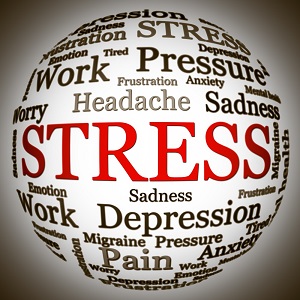 When your adrenal glands are worn out and unable to produce enough hormones, mainly cortisol, as a result of ongoing stress or infections, this condition is known as adrenal fatigue.
When your adrenal glands are worn out and unable to produce enough hormones, mainly cortisol, as a result of ongoing stress or infections, this condition is known as adrenal fatigue.
Maybe you’ve been feeling under the weather for a while.
You may experience excessive exhaustion, sluggishness, or even difficulty falling asleep.
You may suffer from adrenal fatigue if you have recently been subjected to many stressful circumstances.
What Causes Adrenal Fatigue?
Prolonged physical, emotional, and spiritual stress can cause adrenal fatigue.
As a result, this may result in several health problems, including irregular sleep patterns, inflammation, or even blood sugar surges.
The theory behind adrenal fatigue is that it results from the adrenal glands’ inability to cope with the demands of a constant fight-or-flight reaction brought on by long-term stress.
Your adrenals respond to stressful situations by releasing cortisol to help your body get ready for a risky scenario.
Your adrenals will eventually wear out if such a situation is sustained for a prolonged period of time for one cause or another.
They are unable to react in tense situations as a result.
Adrenal Fatigue Has Three Phases
 There are three possible stages in which this condition can manifest.
There are three possible stages in which this condition can manifest.
A prolonged stimulus to the adrenal glands can result in a rise in blood cortisol levels, which sets off the first stage.
Other important hormones like progesterone, estrogen, and testosterone will not be produced as much at this stage.
Eventually, this will cause your defense system’s regular operations and even your metabolic rate to become out of whack.
A decline in cortisol and DHEA levels is a feature of the second stage of adrenal exhaustion.
You might begin to show signs of memory loss, recurrent infections, anxiety, insomnia, sadness, and weight loss, to name a few.
On the other hand, phase three of this disease starts when the adrenal glands cannot produce cortisol, and other hormonal imbalances may happen.
Eventually, you’ll develop chronic fatigue, which could prevent you from carrying out daily chores and job-related activities.
How to Prevent Adrenal Fatigue
Eat Your First Meal Within an Hour of Waking: To prevent a sharp decline in your blood sugar levels in the morning, eat your first meal within an hour of waking.
Skip Processed Foods: Eating too many processed foods, which your body has difficulty digesting, is one of the many ways that stress can manifest itself.
You can help your adrenal glands return to normal by removing them.
Avoid High-Impact Exercise: When battling adrenal fatigue, it’s essential to engage in low-impact exercise.
Another type of stress on the body is high-impact exercises, which make it more difficult for your adrenals to recover.
Think about doing some moderate cardio or yoga.
Say Yes to Fresh Air: Getting some fresh air and taking a nature stroll are also excellent ways to reduce stress.
 Explore the outdoors. Relax by taking a few calm, deep breaths.
Explore the outdoors. Relax by taking a few calm, deep breaths.
Consume B vitamins: B vitamins, such as B5, can assist in hormone balancing and help the body recover from the effects of adrenal exhaustion.
Get Lots of Sleep: Sleep deprivation adds to the body’s tension levels. Your cortisol levels will increase, and your adrenal glands will labor harder if you don’t get enough sleep.
Your adrenal levels will stabilize, and cortisol levels will drop with more slumber.
Include Protein: Protein includes amino acids like tryptophan, which relax your body, help you feel less stressed, lower your cortisol levels, and combat adrenal fatigue.
Protein is found in foods like organic turkey.
Avoid Caffeine: Coffee is one of the main causes of adrenal fatigue because it raises your cortisol levels, causing your adrenal glands to secrete too much cortisol, which causes adrenal fatigue.
Magnesium: Magnesium supports the health of the adrenal glands by balancing hormone production levels and reducing the impacts of adrenal fatigue.
Magnesium and magnesium-rich foods, such as fatty seafood, avocado, legumes, and leafy greens, are high in magnesium.
Organic Vegetables: The antioxidants, fiber, vitamins, and minerals found in organic green leafy vegetables and purple and brown vegetables support the health of the adrenal glands.
Therefore, it’s crucial to include at least six portions of them in your diet each day.
Drink Half Your Body Weight: Hydration is important for the health of the endocrine system, so be sure to drink daily amounts of purified water equal to about half your body weight.
Make sure to consume 75 ounces of water if you weigh 150 pounds, for instance.
Epsom Salt Bath: An Epsom Salt bath helps to restore and heal your adrenals on several levels.
First, taking a few relaxing Epsom salt baths a week will help you unwind and lower your stress levels, which will also help prevent adrenal fatigue by reducing the production of the stress hormone cortisol.
Additionally, magnesium levels are the first to fall off when you are under tension. Use at least one cup of Epsom salt per soak to restore magnesium levels.
Find Time to Relax: It cannot be emphasized enough that worry is the primary cause of adrenal fatigue, making relaxation the most crucial thing you can do.
To lower your stress levels and help your adrenals heal, use some essential oils, take slow, deep breaths, and relax.
Have Regular Meals Breaks: Throughout the day, take regular meal breaks that contain complex carbohydrates, good fats, and protein.
It’s crucial to avoid skipping meals because doing so will also cause adrenal tension. Also, always consume your meals slowly and not in a hurry!
Find Ways to Relieve Stress!
Your perception of “success” might be putting you at risk for developing chronic worry. Instead of accepting the notion that living a life full of stress is a badge of pride, start to question it.






